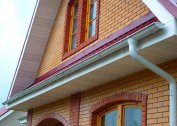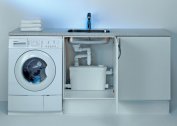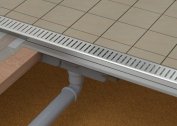Due to the small volume of cesspools in street toilets, many owners of private homes face some difficulties. The contents of the pits have to be periodically pumped out, and the rental of special equipment, without which in this case simply can not do, is not a cheap pleasure.
In this case, it is worth buying chemicals that contribute to the decomposition of organic and inorganic waste. At the same time, household chemicals removes unpleasant odors, disinfects and disinfects surfaces.
The use of chemicals
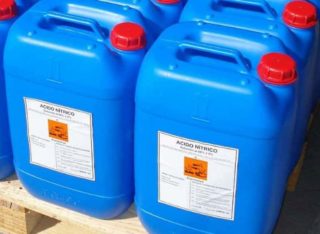 Chemical products for cesspools are used for:
Chemical products for cesspools are used for:
- promoting the rapid decomposition of organic waste;
- reducing the volume of sewage and liquefying sludge at the bottom;
- getting rid of unpleasant odors.
But they are not recommended to be used if the recycled waste will later be used as fertilizer for the soil.
Principle of operation
The cesspools periodically need to be cleaned, and how often it is necessary to clean it depends on the operation. Cleaning of sewage pits is carried out in different ways: mechanical, biological, chemical. The latter option is the most efficient and easiest. The principle of operation of chemicals is to convert soluble compounds with reagents into sparingly soluble ones. The main thing is that the selected agent should be able to minimize the amount of fecal matter and can recycle paper, cellulose and filtered solids.
A variety of chemistry, their pros and cons
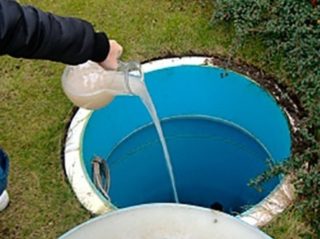 Chemicals used to clean cesspools, depending on the active components, are divided into main subgroups:
Chemicals used to clean cesspools, depending on the active components, are divided into main subgroups:
- formaldehydes;
- ammonium salt compounds;
- nitrate oxidizing agents;
- bleaching powder.
They have many advantages:
- effectively function at any temperature;
- convenient to use;
- differ in a large assortment;
- not afraid of aggressive impurities and hard water;
- have an affordable cost.
As for the shortcomings, the chemicals:
- negatively affect metal pipes and some types of plastic. With prolonged contact with chemicals, the pipes begin to succumb to corrosion;
- harmful to the environment, since under their influence vapors and gases are released from cesspools;
- when ingested, beneficial enzymes are destroyed and all living microorganisms die;
- lead to the accumulation of pathogenic bacteria. In this regard, it is further prohibited to use treated wastewater as fertilizers.
Formaldehydes
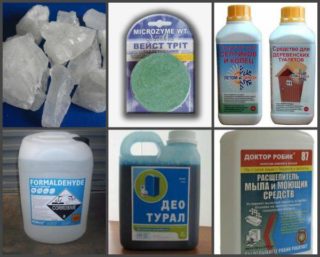 More recently, the use of foldehyde in the cleaning of cesspools was the most practical, affordable and convenient option. Now formalin is used only as a disinfectant, as it is toxic to people and the environment. Formalin is currently not available.
More recently, the use of foldehyde in the cleaning of cesspools was the most practical, affordable and convenient option. Now formalin is used only as a disinfectant, as it is toxic to people and the environment. Formalin is currently not available.
Ammonium salt compounds
Preparations made on the basis of ammonium salt compounds are distinguished by a high degree of disinfection. They stimulate fecal matter to decompose, remove unpleasant odors. However, they negatively affect the environment and human health. They are allowed to be used provided that the country toilet is located no closer than 20 meters from the house. If the sewage pit is disinfected with ammonium salts, only vacuum pumping must be used.
Nitrate oxidizing agents
Compared to ammonium salts and formalin, nitrate oxidizing agents (or nitrogen fertilizers) are considered more sparing.When using them, it is allowed to use decomposition products from sewage pits as fertilizers. They are environmentally friendly, neutralize specific odors, turn the contents of cesspools into a homogeneous mass. But they differ in high cost and negatively affect metals.
Bleaching powder
Due to its affordable cost, bleach is widely used in the disinfection of cesspools and sewage pits. But this remedy is toxic to humans. It is necessary to work with it very carefully (with gloves, a respirator, goggles), carefully following the instructions from the manufacturer. Keep the powder in a dark and cool place. Since when exposed to sunlight, it will experience a loss of active chlorine.
Release form
According to the form of release, chemistry for street toilets is divided into:
- liquid formulations. They are the most effective and cope with various contaminants. They are a ready-to-use solution. Their principle of action begins immediately after being poured into the tank. The most popular means are: “Deo-Tural”, “West-Trit”, “Country - aqua”;
- powder products. They are diluted with water according to the instructions and infused for 20 minutes, after which they are poured into the sewer. Experts recommend reducing the concentration of funds when used in metal containers;
- tableted. Convenient to use. The number of tablets used directly depends on the volume of the sewage tank. Destroy even the most persistent odors and dissolve most of the bottom sediments of the solid structure.
Popular tools for cesspools
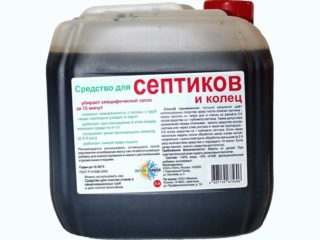 The most common septic tanks for street toilets are:
The most common septic tanks for street toilets are:
- Dr. Robik. Available in powder or liquid form. Dissolves solid waste, chlorine, paper, soap residues. It is used for temperature fluctuations and is resistant to negative factors. The duration of the drug is 30 to 40 days.
- Wayt - Trit. It is used in open and closed toilets. Cope with chemicals, chlorinated water, detergents. Its contents (dry powder) are diluted in containers with warm water, infused for about half an hour and poured into a cesspool. Reprocessing of the country toilet is carried out after 30 days.
- Septifos. Used in closed toilets, available in the form of granules. The product eliminates unpleasant odors, removes residual waste on the bottom and walls of cesspools.
- Vodogray. It is used to clean sewer pipes and toilets. Eliminates solid feces, odors and effectively cleans the walls and bottom of the pit of sludge.
- Happy summer resident. It is used when cleaning drainage systems and cesspools. It consists of microorganisms that process waste into carbon dioxide.
- Saneks. Destroys fats, paper and waste products. Available in powder form. It is used at any temperature conditions.
- Deo - Tural. It is a liquid concentrate for cesspools with a disinfecting and disinfecting effect. It is used for mobile toilet stalls, cesspools, bio toilets.
- Devon - n. Nitrate oxidizing agent used for cesspools. It is environmentally friendly, as it contains no formaldehydes, alkalis, acids and ammonium compounds. 50 ml of the drug is diluted in 2 liters of water and poured into the pit. It is not afraid of frosts, detergents, well removes odors, liquefies fecal matter in cesspools.
Rules for choosing chemical cleaning agents
When choosing means for cleaning cesspools, it is necessary to determine in advance how recycled wastewater will be used in the future. If you give preference to chemicals, then the treated effluents can not be used as fertilizers. The only exceptions are nitrate salts, which are the least dangerous and non-toxic.
Also, when buying chemicals, it is worth considering the material of the walls at the cesspool and the presence of plastic or metal pipes in it. Since most products are aggressive to certain materials. If a fecal pump is used when pumping the drain, then the choice of chemistry should be treated with caution and care. Since the surface of the pump will suffer the most from aggressive drugs.
Also, when buying chemicals, you need to consider whether detergents and household chemicals get into the cesspool. Under their influence, some drugs lose their effectiveness.
Chemical products for outdoor toilets effectively deal with the tasks: kill the pungent odor, process fecal matter, and disinfect surfaces.
